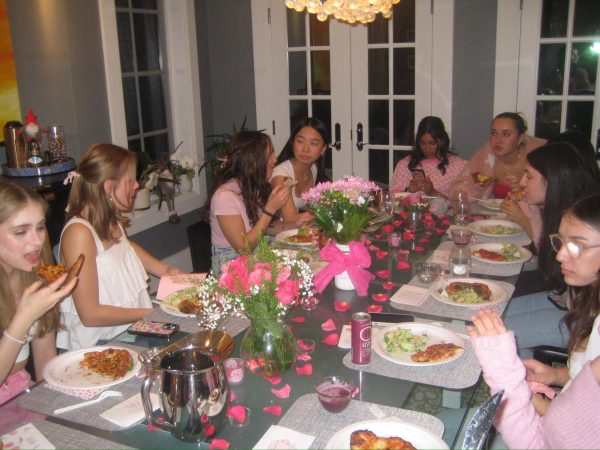The price of prestige
Melissa Li, senior, does homework while wearing a Harvard hoodie. Li aspired to attend an elite school since freshman year.
In November of 2018, The New York Times published an exposé on a Louisiana school that had become popular because of videos posted online of students getting into their dreams schools. Colleges like Harvard, Princeton, Yale, and Brown were accepting students from the T.M. Landry College Preparatory school.
The success of the school seemed too good to be true, especially considering the income and education statistics of this town. Soon the NY Times found out that the founders and leaders of the school, the Landry’s, were changing grades and classes on students’ transcripts and encouraging students to lie on their college applications.
“Raymond Smith Jr, who graduated from T.M. Landry in 2017, said that Mr. Landry forced him to exaggerate his father’s absence from his life on his N.Y.U. application,” said Erica Green, Times author.
This scandal brings up the despairing question of what people would do to get into prestigious schools, and more than that merely to get the reputation of success. Most of the time, as it was in this case, it isn’t even the students who push so hard but rather the adults around them who feel as if prestige and reputation are the only parameters to measure success.
Louisiana police investigate allegations of physical abuse at T.M. Landry College Preparatory School, where The Times reported violence and transcript fraud in a story last month https://t.co/rV0uMBoHDS
— The New York Times (@nytimes) December 12, 2018
Even in our own school and community, this problem runs deep.
Butler Middle School, one of Central’s feeder schools, is currently faced with a $50 million federal lawsuit filed by Komal Julka, who was accused of registering as a home school provider in order to get the geography bee questions beforehand. Evidence suggesting this included emails showing she paid for the questions with her card and subsequently created a school name and address.
“I think the lawsuit is a waste of time because they should have resolved this problem beforehand,” said Zahid Afzal, a resident of the Butler 53 district. “Parents should be supportive of their kid’s academics but they have to realize that all students have different levels of ability and different strengths, so they have to nurture those and support their kids in that respect.”

Butler Junior High, a middle school in Oak Brook that feeds into Hinsdale Central.
Situations like the one at T.M. Landry and even at Butler demonstrate this need to push students excessively to be the best. Some parents are more involved in their children’s academic lives than others, which often times can yield negative results.
“We try to encourage students to self-advocate because those are skills they are going to need when they go onto college,” said Ms. Regnier, Director of Counseling and Social Work. “Colleges will not to talk to parents, and parents won’t have access to grades or anything unless the student gives them access. However, there are some parents who have a hard time letting it go. They do things like call about their kid’s college applications when really it should be the student at that point who should be leading it.”
The T.M. Landry accusation also brings up the problem of the power that prestige has when it comes to college. The leaders of the school had the primary goal of getting their students into Ivy and Top 20 schools, and clearly, they would do anything to get them there.
Often times students, even at Central, feel pressured to apply to more prestigious schools merely based on their academic reputation and acceptance rates. The competition between students can breed this type of environment where students feel the need to get validation from college acceptances.
“There are a lot of kids who apply to these prestigious without even knowing whether or not they really want to go,” Ms. Regnier said. “Many students just look at the acceptance rate and apply rather than looking at whether or not they would be happy there. Just because Harvard may have a low acceptance rate and great academics does not guarantee that a specific student would enjoy their time there. Everyone is different. You would be surprised at how many kids switch their schools after freshman year.”
Some students feel that the competitive environment can affect their decision making when applying to colleges.
“Honestly [college acceptances] were just so stressful for me especially when a lot of my friends started getting into really prestigious schools, I felt like I needed to prove myself too,” said Harini Loganathan, senior. “This whole feeling drives me crazy even now and I really wish that our school wasn’t so obsessed with having to go to a name-brand college. We need to focus on finding a school that’s a perfect fit for the person.”
Regardless of whether it is the adults around the students or the students themselves, there is both intimidation and pressure that many experience in regards to academics.

Hajera Naveed is a Senior Writer and Section Editor for Devils' Advocate. Her hobbies include writing, volunteering, painting, and running. When she isn't...















